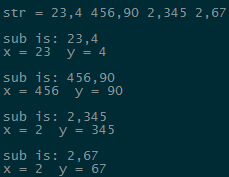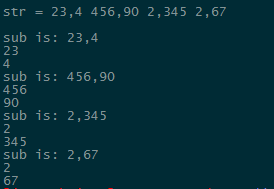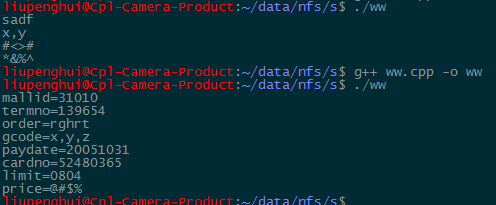由于工作需要,自己找资料学习了,现在分享出来,有需要的同学看看。欢迎各位提出更好的办法,大家共同学习
先上C++版本的 Linux:g++
#include <iostream>
#include <sstream>
#include <string.h>
#include <stdlib.h>
using namespace std;
int main()
{
string str = "23,4 456,90 2,345 2,67";
string sub;
int x = 0;
int y = 0;
char ch_x[16] = {0};
char ch_y[16] = {0};
int len = 0;
int len_1 = 0;
int len_2 = 0;
std::string::size_type pos = 0;
istringstream iss(str); //用于将字符串以空格分开,分割成子串
cout << endl << "str = " << str << endl << endl;
while(iss >> sub)
{
cout << "sub is: " << sub <<endl;
memset(ch_x, 0, sizeof(ch_x));
memset(ch_y, 0, sizeof(ch_y));
pos = sub.find(',');
if (std::string::npos != pos)
{
len_1 = sizeof(ch_x) - 1;
len_2 = pos;
len = (len_1 > len_2) ? len_2 : len_1;
if (len > 0)
{
strncpy(ch_x, sub.c_str(), len);
ch_x[len + 1] = '\0';
}
len_1 = sizeof(ch_y) - 1;
len_2 = sub.length() - (pos + 1);
len = (len_1 > len_2) ? len_2 : len_1;
if (len > 0)
{
strncpy(ch_y, sub.c_str() + (pos + 1) , len);
ch_y[len + 1] = '\0';
}
x = atoi(ch_x);
y = atoi(ch_y);
cout <<"x = " << x << " " << "y = " << y << endl << endl;
}
}
return 0;
}

#include <iostream>
#include <string.h>
#include <stdlib.h>
using namespace std;
int main()
{
int i = 0;
int x = 0;
int y = 0;
string strTemp = "12,34 56,789 3,2345 432,1";
string str1;
string str2;
std::string::size_type pos = 0;
string::size_type pos1 = 0;
int len = 0;
int len_1 = 0;
int len_2 = 0;
char ch_x[16] = {0};
char ch_y[16] = {0};
for(i = 0; i < 4; i++)
{
pos1 = strTemp.find(' ');
if(-1 == pos1) //没找到
{
str1 = str2;
}
else
{
str1 = strTemp.substr(0, pos1); //空格之前的子串
str2 = strTemp.substr(pos1 + 1, strTemp.length() - (pos1 + 1)); //空格之前的子串
}
memset(ch_x, 0, sizeof(ch_x));
memset(ch_y, 0, sizeof(ch_y));
pos = str1.find(',');
if (std::string::npos != pos)
{
len_1 = sizeof(ch_x) - 1;
len_2 = pos;
len = (len_1 > len_2) ? len_2 : len_1;
if (len > 0)
{
strncpy(ch_x, str1.c_str(), len);
ch_x[len + 1] = '\0';
}
len_1 = sizeof(ch_y) - 1;
len_2 = str1.length() - (pos + 1);
len = (len_1 > len_2) ? len_2 : len_1;
if (len > 0)
{
strncpy(ch_y, str1.c_str() + (pos + 1) , len);
ch_y[len + 1] = '\0';
}
x = atoi(ch_x);
y = atoi(ch_y);
strTemp = str2;
}
cout << x << "," << y << endl;
strTemp = str2;
if(-1 == pos1)
{
break;
}
}
return 0;
}
#include <iostream>
#include <sstream>
#include <string.h>
using namespace std;
int main()
{
string str = "23,4 456,90 2,345 2,67";
string sub;
string s;
istringstream iss(str); //用于将字符串以空格分开,分割成字串
cout << endl << "str = " << str << endl << endl;
while(iss >> sub)
{
cout << "sub is: " << sub <<endl;
istringstream issx(sub);
/*getline()函数会生成一个包含一串从输入流读入的字符的字符串,直到以下情况发生会导致生成的此字符串结束。
1)到文件结束,2)遇到函数的定界符,3)输入达到最大限度 此处为情况二,界定符为',' 情况一导致while结束
*/
while(getline(issx, s, ','))
{
cout << s << endl;
}
}
return 0;
}

#include <iostream>
#include <vector>
#include <iterator>
#include <algorithm>
#include <sstream>
using namespace std;
int main()
{
string input = "mallid=31010\rtermno=139654\norder=rghrt gcode=x,y,z\npaydate=20051031\ncardno=52480365\rlimit=0804\nprice=@#$%";
istringstream iss(input); //好多人说\n是默认的分界符,可是以上貌似空格、回车、换行都行
copy( istream_iterator<string>(iss) , istream_iterator<string>(), ostream_iterator<string>(cout,"\n") );
return 0;
}
#if 0
int main()
{
string o_str = "sadf x,y #<># *&%^";
vector <string> str_list;
int comma_n = 0;
int i = 4;
do
{
string tmp_s = "";
comma_n = o_str.find( " " );
if( -1 == comma_n )
{
tmp_s = o_str.substr( 0, o_str.length() );
str_list.push_back( tmp_s );
break;
}
tmp_s = o_str.substr( 0, comma_n );
o_str.erase( 0, comma_n+1 ); //返回一个迭代器,指向被删除的最后一个字符的下一个位置
str_list.push_back( tmp_s );
}while(i--);
copy( str_list.begin(), str_list.end(), ostream_iterator<string>(cout,"\n") );
return 0;
}
#endif

C版本 Linux:gcc 需要哪一段,放开#if 0即可
#include <stdio.h>
#include <string.h>
int main()
{
char buf[] = "23,45 565,34 324,1 24,780";
char *delim = ", ";
char* token = strtok(buf, delim);
while( token != NULL )
{
printf("%s ", token);
token = strtok(NULL, delim);
}
printf("\n");
return 0;
}
#if 0
int main()
{
char *source = "hello, world!, welcome to china!";
char *delim = " ,!"; //以该字符串中的任一字符分割
char *token;
/*功 能: 将串拷贝到新建的位置处
strdup()在内部调用了malloc()为变量分配内存,不需要使用返回的字符串时,
需要用free()释放相应的内存空间,否则会造成内存泄漏。
这里由于后面strsep()的使用,free()只能释放一部分内存,故不加free(),
这里只是为了学习strdup()
*/
char *s = strdup(source);
/* strsep()功能:分解字符串为一组字符串。从s指向的位置起向后扫描,
遇到delim指向的字符串中的字符后,将此字符替换为NULL,然后将s更新
指向到NULL的下一个字符串,返回s原来指向的地址
*/
for(token = strsep(&s, delim); token != NULL; token = strsep(&s, delim))
{
printf("%s",token);
printf("-");
}
printf("\n");
return 0;
}
#endif
#if 0
int main()
{
char token[] ="12,34 1,456 23,5 146,34"; //定义成 *token 会发生段错误
char *str = token;
char *buf;
while(str)
{
buf = strsep(&str," ");
printf("%s\n",buf);
}
return 0;
}
#endif

























 1万+
1万+

 被折叠的 条评论
为什么被折叠?
被折叠的 条评论
为什么被折叠?








